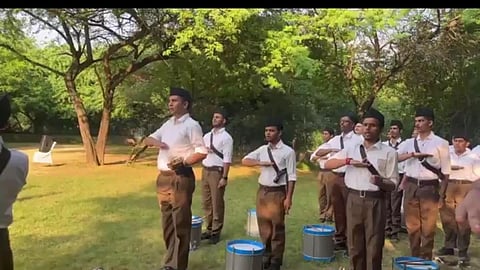

"Why should a public university support one religion and one political ideology while denying students from other communities the same space?" says Aarav, a student from Central University of Jammu (CUJ). His concern that this "conveys the idea that some beliefs are accepted while others are marginalised" is valid.
The question became all the more relevant earlier last month when CUJ allowed the first-ever Rashtriya Swayamsevak Sangh (RSS) path sanchalan (route march) within the campus as part of the Vijayadasahami celebrations coinciding with the centennial commemoration of the RSS. The hosting of this event on October 6 raises a pertinent question about the politicisation of a government-funded organisation.
The public-funded university, which is intended to accommodate students from various backgrounds, has frequently permitted activities related to the RSS and other Hindu religious or BJP-affiliated events, such as the anniversary of Ram Kshetra. However, authorities frequently prohibit cultural events from different communities, regions, or religions due to "regional" or "religious" concerns.
RSS Framing Versus Ideology
The RSS describes itself as a cultural organisation dedicated to promoting Hindu values and social service, yet this framing obscures its fundamentally political character. Since its founding in 1925, the RSS has operated through a network of affiliated organisations that shape electoral politics, educational curricula, and social policy in India. Its core ideology, which defines Indian national identity primarily through Hindu religious and cultural markers, inherently positions religious minorities, particularly Muslims and Christians, as outside the national mainstream.
In contrast to the projection of RSS as a cultural organisation, its opposition to secularism, and role as the ideological parent of the BJP reveal it to be fundamentally a politico-religious movement seeking to redefine India’s constitutional democracy along communal lines.
It is for these reasons that the RSS march event raises genuine and legitimate concerns from students and observers. Though the organisers of the event were a show of discipline and patriotism, the well-documented history of the RSS reveals that a deliberate attempt to compromise the university’s functioning as an impartial learning space.
The impression that a central, publicly funded university is advancing a single political ideology under the cover of culture is not significantly diminished by such explanations.
The Visible Bias & The Concerns
By obliterating the difference between ideology and education, the administration exposed its apparent and institutional bias for one political ideology and religion, concerns of which were heightened due to the active participation of faculty members in such gatherings.
Shockingly, several faculty members, including the University’s Vice Chancellor and Registrar were party to the event. A post shared by the official Instagram handle of the Central University of Jammu featured several visuals from the event. A total of 96 swayamsevaks (volunteers), including students, research scholars, teaching and non-teaching staff, participated in full uniform. Additionally, 205 guests, including students, research scholars, faculty, non-teaching employees, and residents of the staff quarters, also took part. The event began with an inaugural session and speeches. The chief speaker was the Prant Pracharak of Jammu, Kashmir, and Ladakh unit of the RSS.
This kind of a large-scale celebration with the official sanction and patronage of the university administration sends a chilling message: Pupils, who hold different political or religious views could experience marginalisation, exclusion, or pressure to fit in.
That is why many students are appalled. “The RSS march in university spaces sends the wrong message. Academic institutions should remain neutral zones for learning and debate, not venues for political or ideological demonstrations,” said Shivam Sharma, an alumnus.
The NSUI unit at CUJ cautions that the campus march led by the RSS endangers student voices and free thought, transforming classrooms into places of indoctrination and terror. They stress that preserving academic freedom is crucial for the survival of democracy and exhort students of all ideologies to speak up in support of universities as venues for discussion, diversity, and creativity.
The RSS, which was established in 1925, projects itself as a cultural and nationalist group. However, its growing prominence and special treatment at a major university beg the important question: Should an establishment that aims to educate young people turn into a platform for ideology? Is it appropriate for universities that receive public funding to prioritise one religion or political ideology over another?
Misplaced Priorities
The RSS’ centenary celebrations on the CUJ campus, apart from demonstrating administrative bias, also smack of disregard for the fundamental well-being of students. The university's leadership seems more concerned with advancing RSS ideology and planning symbolic events than with attending to fundamental necessities.
The university's ongoing serious disregard for the welfare of its students only serves to fuel the controversy. Reports of bad food, frequent power outages, and unclean facilities indicate that hostel conditions are still terrible. Recently, several students were admitted to the hospital after possibly contracting food poisoning from the hostel's mess.
The situation at Central University of Jammu is far from perfect, even though many events have been planned under Swachhata Hi Seva 2025, encouraging students to commit to cleanliness. There are severe concerns over student safety and hygiene because restrooms and bathrooms, especially in the women's dorms, are still in awful condition.
Authorities were forced to separate university buses for boys and girls when a male faculty member allegedly took a female student's ID Card during a hostel strike, which made matters worse and served as a clear reminder of the administration's inability to maintain safety and responsibility.
Serious concerns are also raised regarding compliance with the Central Civil Services (Conduct) Rules, 1964, which forbid central government employees from participating in political activities, given the involvement of faculty members and non-teaching staff in organising the centenary commemoration of the RSS. Senior university employees must not support a particular political or religious ideology while serving in their official capacity.
Such actions, of promoting a certain politico-religious ideology, require immediate examination and accountability if Indian higher education is to continue being inclusive, secular, and free-thinking.
Have you liked the news article?